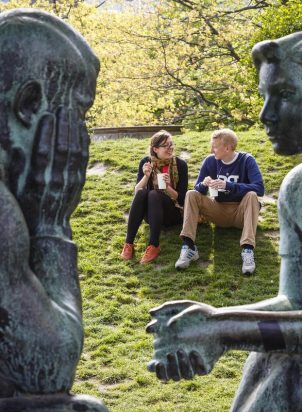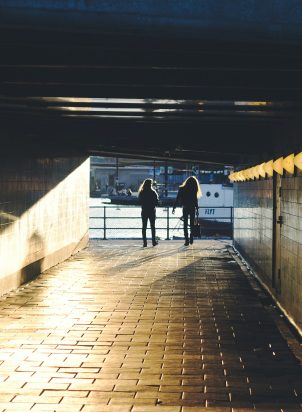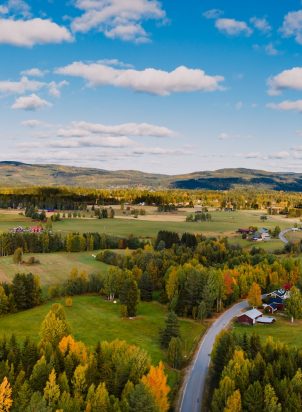Rural development in a changing regional landscape was the headline for this year’s Nordregio Forum that brought some 130 participants from the entire Nordic-Baltic region together in Lund for an exciting two days of presentations and discussions.
Nordregio Forum 2018 was held within the framework of the Nordic Thematic Group on Rural Development, one of the three working groups under the Nordic Council of Ministers for Regional Affairs. The Changing Ruralities conference was moderated by Norwegian-Italian Brit Pellegrino Riccardi ,whose declared aim was to challenge the images of regional development in a changing world for Forum participants.
International cooperation
The opening speech was held by Director Johan Krafft from the Swedish Ministry of Enterprise, representing the Swedish chairmanship of the Nordic Council of Ministers, who stated that in times where international governance is threatened, Nordic co-operation is more important than ever and that both European cohesion policy and Nordic cooperation require knowledge sharing so we can grow together and strengthen our global as well as local and regional development.
He was followed by Director of Regional Development for Region Skåne, Ulrika Geeraedts, who exemplified his remarks by showing a promotional video for Greater Copenhagen, the perfect example or good cross-border cooperation. She furthermore underlined, that when it comes to regional development, urban and rural development supplement each other, it is not a zero sum game, but a question of cross fertilization.
Voices from the field
A recurring topic throughout the Forum was the need to listen more to people who actually live in the rural regions to get their perspective on the planning and development needs. Bjørn Egil Flø from NIBIO delivered a very critical discourse on what he saw as the carnivalization of rural life, reduced to a recreational zone for creative project makers from the city and neoliberal globalizers.
This was countered by an actual project maker with a very successful business, namely Signe Aarhus of Oleana textiles, with very firm roots in traditional crafts and an inclusive outlook on both Europe and the rest of the world.
Regional overview
The morning session was summed up by Academic Director Karen Kjeldgaard and Senior Research Fellow Michael Kull from Nordregio, presenting both rurally relevant results from the State of the Nordic Region 2018 report as well as recent research on attractiveness and resilience in rural regions.
After lunch, a panel of national experts gave an overview of the regional landscape in the Nordics, followed by an analysis of administrative reforms across the Nordic countries by Siv Sandberg from Åbo Academy. Finally, the first day featured parallel sessions highlighting other aspects of ongoing Nordregio research, including sustainable tourism, cross-border cooperation as well as the blue and green bioeconomy.
Urban-rural linkages
The second day of Nordregio Forum 2018 featured a closer look at rural-urban relations, including additional parallel sessions on attractiveness and mobility in rural areas as well as a session on young people and educational choices.
The programme opened with Research Director Hans Thor Andersen from the Danish Building Research Institute who claimed that urbanisation is not as inevitable as usually assumed. Nordic medium sized cities grow more than metropolitan areas and many youngsters move back to the countryside when forming families.
He was followed by Professor Hilkka Vihinen from Finnish research institute LUKE, who argued that future changes in technology and transport options may in fact favour the rural areas and that residential patterns are often more nuanced than reflected in development scenarios. As an example she pointed to the fact that some 2.2 million Finns move to their second (rural) homes during the Summer period, but this is not taken into account when planning local infrastructure.
So policies and governance practices are not up to date when dealing with the reality of residential and migratory patterns between city and countryside, she stated, calling for better statistics and research to reflect urban-rural interactions.
Living in the countryside
Finally, Emilia Widerström, president of the youth organization of the Swedish rural association, gave a very personal account of why she loves her life in the countryside. She addressed amongst other things the many stereotypes that exist on both city life and countryside life, as well as conflicting rural-urban images and perceptions: if you grow up in the countryside you should move to the city, otherwise you are a loser. But if you come from the city, it is seen as cool to move to the countryside, she stated.
Her presentation was supported by the youth panel that closed the conference with a call for more engagement from policy makers in the real lives of young people in the rural regions, and support for both better dialogue in general as well as more concrete measures such as better access to digital networks.
Nordregio Forum 2019 will be held at the Harpa conference center in Reykjavik, Iceland on November 27-28 and preparations are already underway. The focus will be on innovative and resilient regions, including a closer look at the potential of digitalization and smart specialization, so a very fitting follow-up to this year’s Forum.



